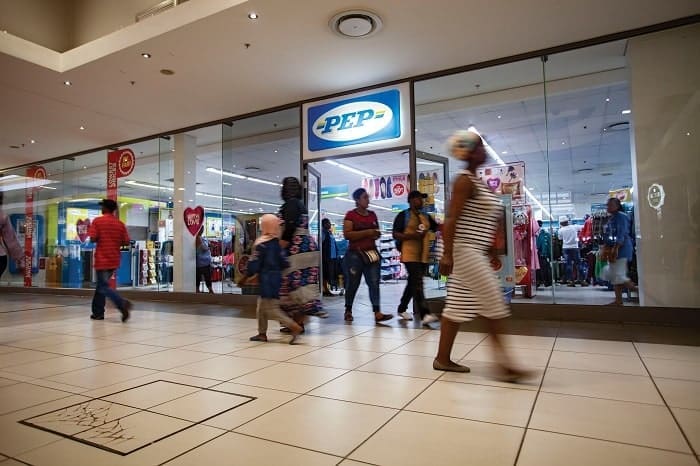JSE-listed Pepkor reports a 7.7% increase in annual revenue, reaching R87.4 billion for the full year ending September 30, 2023.
The group’s operations demonstrated exceptional working capital management, resulting in a 15.9% rise to R13 billion in cash generation compared to the previous year.
Pepkor, the owner of household brands such as Pep, Ackermans, Tekkie Town, Buco, and Incredible, maintained a store base of 5,917 at year-end. despite ongoing national challenges affecting the operating environment and consumer livelihoods, the group successfully secured market share gains in key product categories.
Key market share gains in highly competitive retail segment
While the competitive environment in the discount and value retail segment remains intense with high levels of promotional activity during the year, market share gains were achieved in key product categories. These gains were spurred by stronger trading in the second half of the year and a 53rd trading week in the group’s South Africa-based clothing, footwear and homeware (CFH) retail brands. Based on 12-month moving average RLC data to September 2023, PEP achieved gains in the Babies, Adult and Home categories, and Speciality expanded market share in the Adult category. Ackermans gained share in the School wear, Younger girls and Lingerie categories, with a positive trajectory emerging in other categories. JD Group expanded market share in the computer and audio categories based on GfK data to September 2023.
Divisional performance highlights
The traditional retail segments, including clothing and general merchandise, furniture, appliances, and electronics, as well as building materials, collectively achieved a revenue increase of 8.0%.
PEP achieved pleasing results with strong like-for-like sales growth of 9.0% in the second half of the year and market share gains across key categories. Meeting the customer’s need for affordability, PEP maintained best price leadership, with a healthy price gap to competitors. PEP opened 96 new stores during the year, mostly driven by the PEP HOME format, and expanded its retail base to 2 602 stores. PEP HOME achieved strong sales growth of 21.9%. The PAXI parcel distribution service, which leverages the retail footprint of PEP and other PEPKOR brands over 2 800 locations, increased volumes by 20% to 4.9 million during the year.
Ackermans reported a marked improvement in the second half of the year, with like-for-like sales declining by 1.1% compared to a decline of 8.3% reported in the first half. Improved inventory levels were achieved following successful clearance of underperforming merchandise through markdowns. Previous merchandise mix and pricing issues were addressed through corrective actions in the late winter and summer 2023 ranges. The strategic implementation of the first full product proposition will be in winter 2024. Ackermans opened 84 new stores, growing the retail footprint to 1 027 stores.
The Speciality business gained market share across most brands in the adult wear market (RLC data). PEP Africa reported good trading results across most countries of operation, supported by customer and volume growth. The store base was consolidated to 227 stores with a reduction of 54 stores, including the exit from Nigeria.
Performance in the group’s Brazilian value retailer, Avenida, exceeded expectations and the business is well ahead of its original value creation plan. Good progress has been made in enhancing Avenida’s competitive positioning as a discount retailer in Brazil. Plans to expand the retail footprint and distribution network have been accelerated with 50 new stores planned per annum.
FinTech
In the FinTech segment, performance in the financial services businesses was supported by the group’s credit interoperability strategy. Tenacity, which supports the South Africa-based clothing and general merchandise retailers, opened a record number of new A+ accounts (794 000) during the year. This positively impacted sales through cross-shopping by customers across group retail brands. The approval rate decreased to 36% from 40% in the prior year, and compares to a historical average approval rate of 38%. Tenacity adopts a more conservative approach compared to peers, where customers are not allowed to make further purchases if one payment is missed. Under this definition, customers able to make purchases amount to 75%, in line with the historical average. The group started to leverage its insurance capability in the Abacus business and introduced credit life cover on Capfin loans and funeral cover in PEP.
With the aim of making smartphones affordable for customers, a cellular handset rental product was developed and is being tested in 180 stores. To date, 120 000 cellular rentals have been provided through both the group’s internally developed capability and third parties.
The Flash business which operates in the informal market, increased profitability by more than 20% for the year. Annual throughput (virtual turnover based on face value of products sold or cash digitised) increased by 11.6% to R37.1 billion this year. The average throughput per trader across the base increased by 11.3%. In terms of making customers’ lives easier, traders are now able to facilitate SASSA grants distribution to beneficiaries.
“The consumer and operating environment in South Africa continue to pose material challenges. As a leading business in South Africa with 50,000 employees, we are acutely aware of our role in making a positive difference to people’s lives. PEPKOR’s purpose resonates with even greater clarity against the backdrop of a persistently tough environment. From positive strides to address youth unemployment, to upskilling our people and ensuring affordable necessities for our customers, such as school uniforms, we will continue to adapt to meet the challenges,” said Pepkor CEO, Pieter Erasmus, said.
Looking to the festive season and beyond, substantial disruption in local port operations is adversely affecting stock inflows. Despite the constraints, trading remains resilient and robust during periods when money is injected into the market, such as payment days for social grants, salaries and wages. The success of the first quarter of FY24 will rely on the performance of festive and back-to-school trade. In FY24, it is anticipated that product inflation will ease to mid-single-digit levels, which will enhance customer affordability and boost sales volumes. The group remains committed to implementing specific cost reduction measures.
